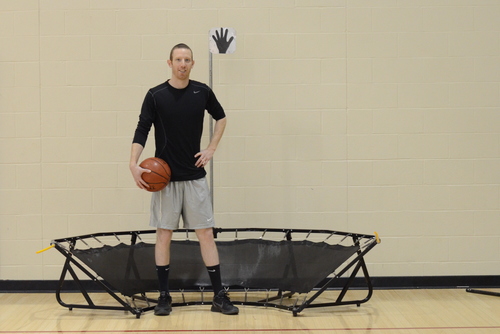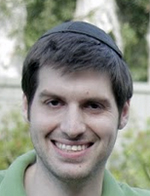From Tamir Goodman’s battle with injuries, new basketball training tool is born

By Jacob Kamaras

(JNS) — When he was sidelined by injuries during his time as a professional basketball player in Israel, Tamir Goodman’s mind was still in the game.
“Specifically during that time when I wasn’t playing, I was spending my time in rehab, but I’d go to every game, I’d go to every practice, and I’d study if there was a scouting report,” Goodman says. “I just spent hours on the sidelines thinking, ‘What’s really needed in basketball, what are the coaches expecting from players?’”
Goodman’s homework paid off, culminating in his creation of the Zone 190—a basketball training tool that combines trampoline-like material with a 190-degree, professional-grade carbon steel frame that allows players to practice a wide range of skills without the presence of a partner. After spending three years in development, the Zone190 rolled out what Goodman calls its first “real model” in early 2014. Goodman says the product, priced at $699, has garnered sales on every level of basketball—from camp, to high school, to college, to the National Basketball Association’s Detroit Pistons.
Hoopsters previously only had access to “one-dimensional” training tools like pitch backs or toss backs, Goodman explains. While such tools are traditionally placed under the net to deliver the ball to shooters in a straightforward manner, they require the recruitment of multiple practice partners for a shooter to replicate receiving the ball from the array of spots on the court that passes in a real game would come from. Goodman says the 190-degree frame of his product changes that reality.
“The uniqueness of the Zone190 is that it allows players to replicate game-like scenarios,” Goodman tells JNS.org. “In basketball, you get the ball from multiple angles. If you’re a post player you get the ball from both sides of the block, if you’re a guard player you’re getting the ball from multiple areas passed to you—the top of the wing, the wing, or [elsewhere] depending on where you are. Depending on where the ball is coming to you from in a game, you have to set your hands and feet accordingly.”
The Zone190 further simulates game-like situations in that it is “the first basketball training system that comes with defensive distractors,” its website says. The tool includes a defensive hand that can be raised, lowered, or removed to accommodate each user.
Nicknamed the “Jewish Jordan” after being ranked among the top 25 high school players in the country, Goodman was profiled in Sports Illustrated magazine and went on to play collegiately for Towson University (a school in Division I, the highest level of college sports), then professionally in Israel. As an observant Jew, he sported his yarmulke on the court in front of national television audiences.
A 32-year-old Baltimore native who now lives in Cleveland, Goodman began a career as a coach and motivational speaker after injuries forced him to retire from Israeli professional basketball in 2009.
When he was at Towson, Goodman’s coaches made National Collegiate Athletic Association (NCAA) history when they reworked their team’s entire game schedule to accommodate his strict observance of Shabbat and Jewish holidays. Goodman has now been similarly accommodated in the context of the Zone190, which will be showcased in a 45-minute presentation on April 6 in Nashville at the Women’s Basketball Coaches Association (WBCA) National Convention, held annually in conjunction with the Final Four of the NCAA Division I Women’s Basketball Tournament. Due to Shabbat, the WBCA allowed Goodman to move his Zone190 presentation at the convention from Saturday to Sunday.
“When I was a little kid, I had this dream of playing Division I basketball, and playing professional basketball, and doing this without playing Shabbat and always wearing my kippah, and that was seen as pretty much impossible,” Goodman says. “But thank God I was able to live out my dream, and now through Zone190, almost continue the same dream. Everyone accommodated me through my playing days, and now the Women’s Basketball Coaches Association has accommodated us as well, in my post-playing career. It has just been such a great blessing and I’m just so thankful to everyone for their help.”
Bonnie M. Norman, manager of professional development and legislation for the WBCA, says the association turned to the Zone190 to address “education around the art of shooting” at this year’s convention.
“We know there are lots of great coaches and shooting instructors out there; we decided to go with Tamir because his product allows players to have an independent shooting workout with a real game-like feel in any location,” Norman says. “The Zone allows players of all levels, from beginner to pro, to work on foundational fundamentals such as ball-handling, hand-eye coordination, and catch-and-shoot skills. Because one piece of equipment can offer so much, it puts developing these skills back in the hands of the player in the offseason.”
Norman, who calls the Zone190 “unique,” says that if she were still a coach at the scholastic level, she “would have purchased one because it is affordable even for programs that fundraise for everything they purchase.”
To enhance the experience of those who buy the product, the Zone190 website features a series of instructional videos for drills in ball-handling, shooting, passing, post skills, and conditioning. Goodman says he has used the Zone190 to work with thousands of kids from all levels, describing that, “The same tool can help a 7-foot center, to a point guard, to an NBA player, to a special-needs kid, to anything in between.”
In fact, the Friendship Circle of Cleveland—a nonprofit that pairs teenage volunteers with children with special needs, primarily for social interaction—is using the Zone190 “to stimulate ball movement so that the children with special needs feel empowered to play along,” says Rabbi Yossi Mazarov, the organization’s executive director.
“It’s purely a matter of confidence,” Mazarov tells JNS.org. “When a kid can throw a ball and it comes back to them, like they’re playing catch… you don’t have to throw it into a small, defined net, but they could use it in this zone, which has so much space, and is so intuitive. [Zone190] just works for them. For many of the children that have handicaps and disabilities or are weakened, they find a sense of confidence in this type of equipment that you won’t find in hoops, or goals, or hockey sticks.”
Mazarov adds that Goodman is “purely genuine and humble, and what I found was that when he brought the Zone190 and he started interacting with the children, you could see the kids’ faces light up, you could see that difference that he makes, that he’s there and doing ball movement with the kids.”
“He brings out the best in the kids, and that gives them confidence,” says Mazarov.
This summer, Goodman will employ the Zone190 in his work at two Jewish camps in Pennsylvania—Camp Nesher and Camp Ramah in the Poconos.
“I’m always working with a lot of Jewish athletes throughout the year and I’m very passionate about teaching young Jewish athletes the lessons of basketball, and the lessons of basketball that they can apply to their life, and the language of basketball—which is maximize your potential, help everyone around you, time management, teamwork, respect,” Goodman says. “All these attributes you learn through basketball, and I think Zone190 is the physical tool that can help that.”
Regarding his battle with injuries that led to his brainstorming on the bench in Israel, and thus his eventual creation of the Zone190, Goodman says he is “just grateful that from a negative experience, I’ve been able to turn it around to a positive.”
“I’m unable to play professionally again… At least my team and I have created something that is going to be able to benefit the next generation of players and the current generation of players,” he says.
*
This article was provided by JNS.org.which is sponsored on the pages of San Diego Jewish World through the generosity of Dr. Bob and Mao Shillman.
*
San Diego Jewish World seeks sponsorships to be placed, as this notice is, just below articles that appear on our site. This is an ideal opportunity for your corporate message or to personally remember a loved one’s contributions to our community. To inquire, call editor Donald H. Harrison at (619) 265-0808 or contact him via donald.harrison@sdjewishworld.com